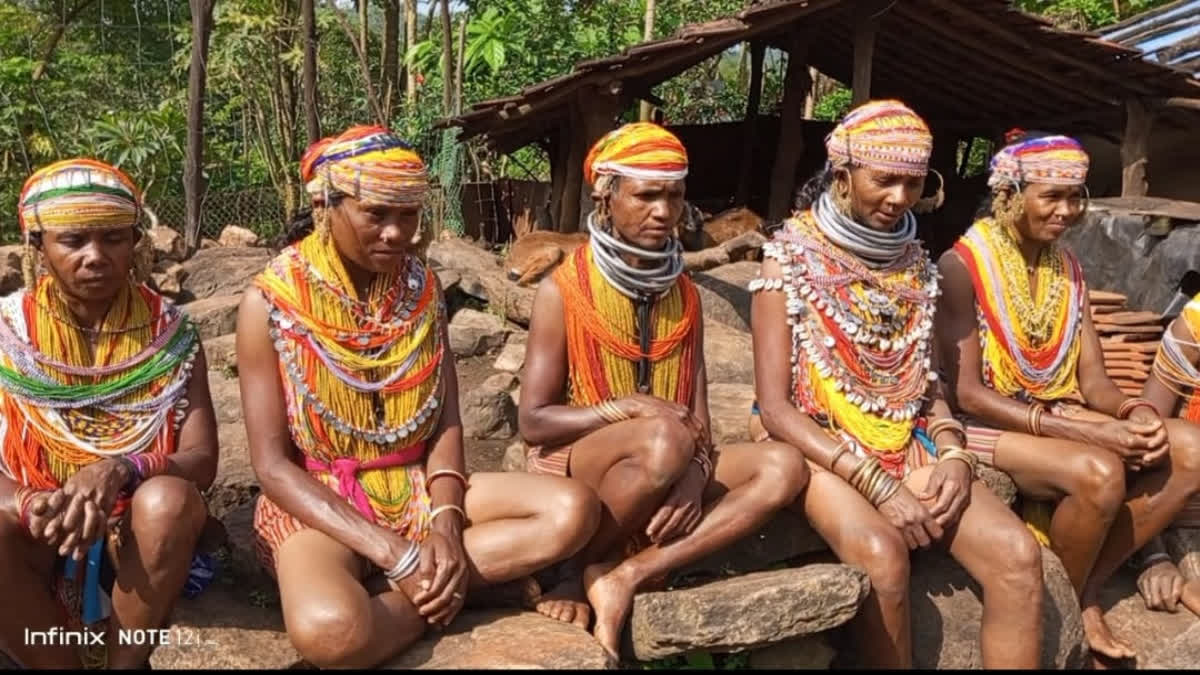Koraput:Their grace does not come from the clothes and beads they wear. It is from the measured footsteps, the rhythmic movement of the body and their unadulterated laughter, all of which combine to create a vibrant collage reflecting the natural tribal life on the canvas of the Onakadeli mountain ranges. Drawn to this pure and pristine beauty are hordes of tourists who reach the Onakadeli market place on the borders of Koraput and Malkangiri - some to click pictures, others to shoot and many who buy the beaded and metal jewellery and natural forest produce the Bondas sell.
Around 20 Bonda men and women from Malkangiri trek around 15 kilometers to reach the Onakadeli market in Koraput, which functions only once a week. As it strikes 9 am in the morning, they reach the market place and begin their trade. Adorned in heavy beaded jewelry from neck to thigh, they use minimum fabric to cover themselves up. The layers of nose rings, ears pierced from top to bottom, necklaces of beads and metals cascading from their necks to thighs through their chest, reflect an ancient, unaltered culture. Not to miss, the crafted waistbands.
Not only Bondas, even tribals like Gadabas from Lamtaput block of Koraput, sell ornaments, especially made with natural beads knit with strings at the market. They also bring along millets, paddy, vegetables, and occasionally their hand woven fabrics like Kereng, a fabric woven with natural string and rare to find. However, with support from district administration and INTACH, the fabric is getting revived. Some also get traditional fruits like kendu, seasonal cherries, Harada & Bahada, local intoxicating drinks like mahuli, chauli, pendam, salap from the mountains.
Untouched by urbanization, the marketplace is frequented by tourists from India and abroad. For Elisa and Princheka from Italy, visiting Onakadeli was an eye-opening experience. They marveled at the Bonda women’s striking attire and intricate bead necklaces, which reflect the community’s deep connection to nature. “The market is not just a place for trade; it’s a celebration of culture that must be preserved,” Elisa remarked.
Domestic visitors, too, find the experience enriching. Shilpa Ramakrishnan, a tourist from Mumbai, described the market as “a living example of India’s rich tribal traditions” and urged families to visit such places to foster cultural pride and awareness. Most of the times, the tourists in awe of the tribals, keep clicking their photographs which the Bondas oblige with a smile, and at times for some quick money.
According to Dr PC Mohapatro, Director of COATS, Onakadeli and similar weekly markets are lifelines for tribal communities. Tribals bring forest produce, crafts, and agricultural goods to sell and in exchange buy essentials like groceries and clothing. These interactions also provide a space for social and cultural exchanges, making the markets hubs of community life.
